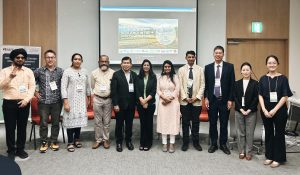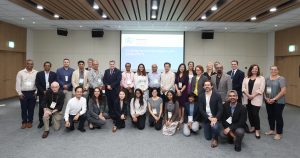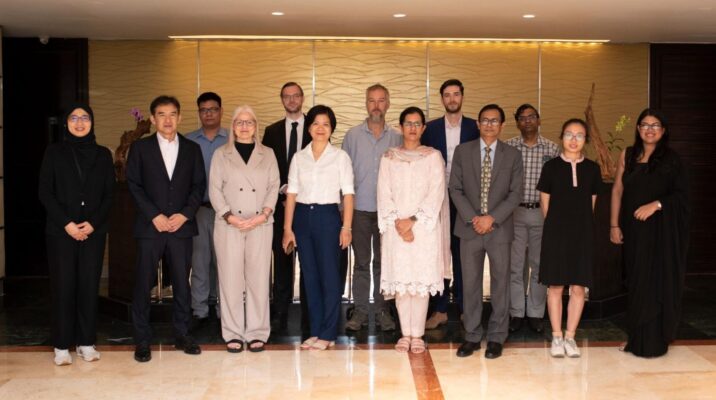With the theme “Resilience for All: Enabling transformative implementation,” the 8th APAN Forum was held in person from 30 August to 1 September 2023 in Songdo ConvensiA, Incheon City, Republic of Korea. APN jointly organised a stream session with the South Asian Forum for Environment (SAFE) on this occasion and participated in numerous associated events. Additionally, APN was invited to attend and present at a side event organised by the UNFCCC Adaptation Committee.
The 8th Asia Pacific Climate Change Adaptation (APAN) Forum is considered Asia-Pacific’s largest and longest-standing gathering of adaptation practitioners to meet, exchange knowledge and experiences, and collaborate towards the pertinent outcomes and practical solutions that are needed to address the challenges of climate change. This year’s forum was hosted by the Ministry of Environment – Republic of Korea, under the bigger umbrella of the Korea Global Adaptation Week 2023 in Songdo, Incheon City. The APAN Forum is a biennial flagship event of the Asia Pacific Adaptation Network (APAN) Secretariat, hosted by the UN Environment Programme (UNEP) Regional Office for Asia and the Pacific with the support of the Ministry of the Environment – Japan.
8th APAN Forum and the APN-SAFE Session

APN and SAFE jointly organised a stream session titled “Enhancing community resilience in the Asia-Pacific Region: Promoting effective governance for locally-led adaptation and sustainable adaptive practices” as part of the 8th APAN Forum. The session introduced case studies on locally-led adaptation (LLA) and sustainable adaptive practices in the Asia-Pacific region, and addressed the long-term planning and strategic programming required to overcome barriers in climate adaptation. The session also evaluated the adaptability and transformative potential of community resilience, extending towards safeguarding livelihoods and sustainable primary productivity, and food system production and supply chains.
The session commenced with opening remarks from Prof. Saleem Huq, Director of the International Centre for Climate Change and Development (ICCCAD), and utilised Mentimeter to engage participants with questions concerning effective planning for community resilience.
Subsequently, the following speakers from APN, Institute for Global Environmental Strategies (IGES), Practical Action Nepal, National Institute for Environmental Studies (NIES), SAFE, Thai Nguyen University of Agriculture and Forestry (TUAF), United Nations University-Institute of Advanced Studies (UNU-IAS) and the University of the Philippines Los Banos (UPLB) introduced the concept of LLA, and case studies on LLA and sustainable adaptive practices in Bangladesh, India, Japan, Nepal, Philippines and Vietnam (click links below to see presentations). The session was followed by Q&A discussions.
The session reaffirmed that addressing the multifaceted issues and challenges identified above is imperative to foster effective community resilience in the Asia-Pacific region, requiring collaborative efforts and innovative solutions from stakeholders across various sectors. Additionally, based on the understanding that there is no one-size-fits-all solution for LLA and sustainable adaptive practices but rather necessitates a persistent cycle of trial and error, the session concluded that we must continue to challenge ourselves on whether we are making any headway to ensure impactful and sustaining climate-resilient future for our vulnerable communities.
UNFCCC Adaptation Committee meeting
The UNFCCC Adaptation Committee organised an event titled “Boosting region-wide coherence on adaptation” from 14:00-17:30 on 28 and 29 August to enhance common understanding of ongoing region-wide and transboundary adaptation efforts in the Asia-Pacific region, explore solutions, areas for collaboration, pathways towards more substantial synergies to address gaps and needs aligning with the global adaptation agenda, and ways in which the UNFCCC Adaptation Committee can support these efforts.

The event centered around seven presentations from organisations and development agencies on regional priorities and their relevant projects in the Asia-Pacific region. The presentation of APN consisted of an introduction to the institution, highlighting its extensive project portfolio focusing on adaptation, resilience, and developing scientific capabilities within agriculture and farming. The presentation also delved into the common challenges and significant obstacles in adaptation coherence identified in these projects and emphasised how APN, in collaboration with its stakeholders, are actively engaged in efforts to surmount these barriers, making it possible for small communities to access innovative programs and enhance their resilience to climate change.
Furthermore, the presentation highlighted key outcomes, including a 2020 knowledge synthesis report on community-based adaptation, ecosystems, biodiversity and extreme weather, etc., the notable achievement of the APN Science Bulletin being indexed in the Elsevier SCOPUS database as of July 2023, and the impact of APN projects with over 100 publications from 60 projects cited in contributions to the IPCC Sixth Assessment Report, with 76% of these citations found in contributions to Working Group II that focuses on impacts, adaptation and vulnerability (to see the presentation, click here). This was followed by moderated discussions and brainstorming sessions on identifying priorities, identifying gaps and needs, discussing windows for support for regional action, understanding and leveraging available resources and success stories, and co-designing solutions.
For further information, please see the event summary published on the UNFCCC Adaptation Committee webpage.


